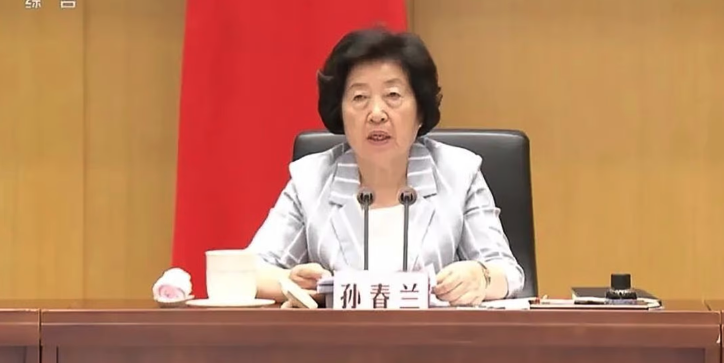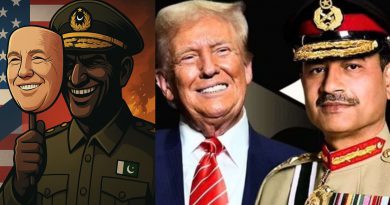Women hit the political glass ceiling at China’s Communist Party Congress
Sun’s departure will leave a void in the party’s upper echelons
Sun Chunlan, China’s “Iron Lady” and the only woman in the ruling party’s Politburo, is due to step down from her post at the 20th Communist Party Congress this week. There’s no guarantee that another woman will succeed her, providing yet another example of the systemic under-representation of Chinese women in leadership positions, which can have very real consequences for the world’s most populous nation.
Sun Chunlan is a special case in the Chinese Communist Party (CCP) galaxy: She is the only woman in the Politburo, the Beijing regime’s powerful executive body. But it’s not for long. Sun is expected to step down from her post during the 20th Chinese Communist Party Congress, the weeklong, twice-a-decade meeting, which began on Sunday, October 16. At 72, China’s “Iron Lady” is past the usual retirement age of 68.
The nerve center of Chinese power could therefore be composed solely of men, aggravating a chronic problem of gender underrepresentation in the nation’s halls of power.
Since 2017, Sun has embodied the CCP’s image of a party unafraid to promote women to top positions. She holds the prestigious title of vice premier, one of only four in the 25-member Politburo.
‘Women hold up half the sky’, but men rule
Sun’s “Iron Lady” moniker has been reinforced over the past two years, since President Xi Jinping appointed her as the country’s top official overseeing China’s Covid-19 pandemic response.
She has been the enforcer of Xi’s “zero-Covid” policy – proof, if proof were needed, that the country’s only female vice premier enjoys the president’s complete confidence to manage one of the most serious health crises confronting the Chinese leader since he came to power in 2012.
But managing the controversial public health policy is not exactly a political gift. Some China experts believe Xi found in Sun an easy “zero-Covid” scapegoat to be sacrificed if his management of the pandemic becomes too contentious. The health dossier has also traditionally been entrusted to women in Communist China; one of Sun’s Politburo predecessors was Wu Yi, who had to deal with the 2003 SARS epidemic.
Nevertheless, Sun’s departure will leave a void in the party’s upper echelons. There are other female candidates for the coveted Politburo post, including Shen Yiqin, the only woman to serve as party general secretary of an entire province, Guizhou, in southern China. Shen also hails from the Bai ethnic minority, “which – cynically speaking – means she simultaneously checks the woman box and the ethnic minority box”, noted the China Project website.
But “nothing obliges the CCP to replace Sun Chunlan with another woman”, explained Valarie Tan from the Berlin-based Mercator Institute for China Studies (Merics). The likely absence of women in the next Politburo, to be unveiled during the 20th Chinese Communist Party Congress, would not be surprising since Sun’s position represents the exception to the rule.
In theory, Communist China claims to be one of the most egalitarian regimes in the world. Schoolchildren across the country are familiar with founding father Mao Zedong’s famous “women hold up half the sky” quote reinforcing constitutional equal rights. “From the founding of the People’s Republic of China in 1949, the CCP has placed equality between women and men as one of the characteristics that distinguish the Communist state from the ‘old China’,” explained Cheng Li, from the Washington-based Brookings Institution, in a report on female representation in Chinese politics.
A very patriarchal party
But the reality is quite different for a country with around 703 million women, constituting 48.7 percent of the total population.
Since 1949, there have been only six women in the CCP Politburo. Three of them were the wives of the founders of Communist China. Among the more than 300 members of the Central Committee – who elect Politburo members and endorse their decisions – there are barely 30 women. In short, only “eight percent of the party’s leadership positions have been given to women”, noted Tan.
The Politburo – of which Sun is a member – in turn selects the all-powerful Politburo Standing Committee. The current Standing Committee has seven members, none of them women.
This underrepresentation is not due to a lack of Chinese women choosing political careers. Between January 2020 and June 2021, for instance, nearly half of new party members were women.
The 20th Congress could have been the occasion to spearhead the fight against the political glass ceiling since the meeting provides an occasion for a major renewal of the party’s upper echelons. But the chances of significant change in female representation are slim.
For starters, the reasons for male domination in top political positions have not been questioned. The party’s executive positions are often reserved for “leaders who had held managerial roles at state-owned enterprises, ministries and regional governments, positions for which women were often bypassed”, noted Minglu Chen, from the University of Sydney’s China Studies Centre, in the South China Morning Post.
Secondly, promotion within the CCP is “entirely based on factional ties rather than individual merits”, Bo Zhiyue, an expert in Chinese elite politics based in New Zealand, told the South China Morning Post. “This has created a very helpless situation because it’s a selection, not an election,” he added.
To rise to the top of the political ladder, aspirants need the right support, and women often have less direct access to those few party figures who can promote their protégés.
Xi is also no champion of women in politics. He embodies “the CCP’s very patriarchal approach to society”, argues Tan. The end of the one-child policy in 2021 was an opportunity for the Chinese president to insist on the importance of “traditional family values”. He has even initiated a campaign to exalt “the unique physical and mental traits [of women] for giving birth and caring for newborns”. In other words, the Chinese leader would rather see women at home than in the office.
A demographic crisis, but women don’t have a say
This lack of women in leadership has important economic and social consequences, noted Tan. “One of the root causes of the current demographic crisis in China is the underrepresentation of women in important positions,” she explained. “The problems of almost half the population are not, or barely, represented in the CCP.”
And so, the incentive to have children is essentially “money distributed to families, without taking into account the deeper reasons why Chinese women do not want to have more children”, explained Tan.
Chinese authorities are also not severe enough when it comes to tackling domestic abuse and violence against women in general, noted Tan. The impunity that some powerful men involved in sexual assault scandals seem to enjoy – such as former vice premier Zhang Gaoli, who is accused of rape by tennis player Peng Shuai – reinforces a “climate that does not make women want to have children”, said Tan.
Communist party honchos who have been setting priorities in recent years to encourage people to have more children “could have benefitted from conversations with women on the Standing Committee”, noted the China Project, referring to the tiny group of Politburo Standing Committee members selected by the 25-member Politburo. “Too bad there weren’t any.”
This article is a translation from the original in French.



